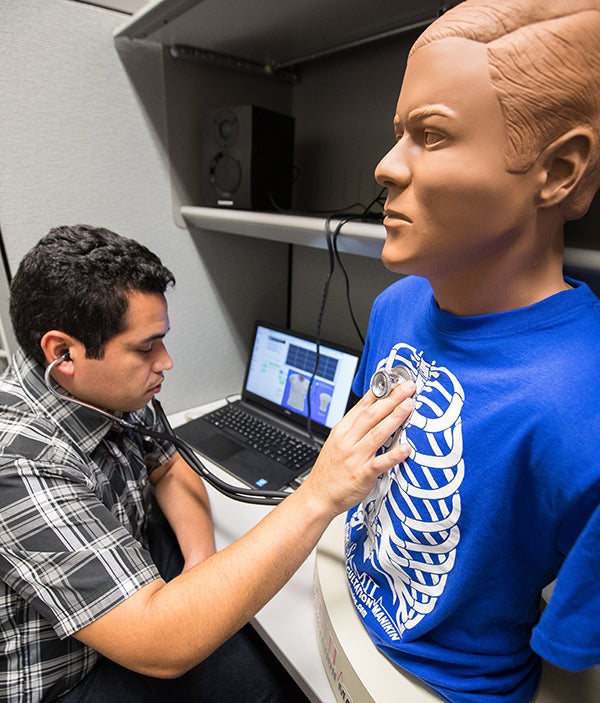Interprofessional clinical simulation program receives provisional accreditation
The Interprofessional Clinical Simulation Program at East Carolina University’s Brody School of Medicine has achieved provisional accreditation in teaching and education by the Society for Simulation in Healthcare (SSH).
Provisional accreditation is the first step towards full accreditation.

The Brody School of Medicine’s Interprofessional Clinical Simulation Program earned provisional accreditation as an integral part of medical students’ educational experience. (Photo by Rhett Butler)
“Receiving accreditation shows that we have high-quality processes, procedures and practices in how we educate our learners,” said Dr. Walter “Skip” Robey, assistant dean for clinical simulation. “It is a world-wide recognition that our simulation program is of the highest quality and meets best practice standards in simulation-based education.”
The program will be recognized at the International Meeting on Simulation in Healthcare in January 2020. Robey and Rebecca Gilbird, director of the office of clinical simulation, will represent the Brody School of Medicine at this event.
“The Interprofessional Clinical Simulation Program would like to extend our appreciation to everyone who has supported the growth and success of the program, in partnership with the Vidant Medical Center, Center for Learning and Performance,” Gilbird said.
Provisional accreditation means the program has met all the initial criteria for accreditation and has two years to fine-tune practices before an on-site visit by SSH reviewers, who will inspect the facility, observe the center’s resources and interview instructors and learners to ensure the center is demonstrating best practices.

Students and health-care professionals learn techniques and proper procedures as part of the Brody School of Medicine’s Interprofessional Clinical Simulation Program. (Photo by Rhett Butler)
“This demonstrates that we have been recognized for our ability to provide high-quality healthcare simulation,” Gilbird said. “We provide numerous opportunities to faculty, staff, students and hospital providers to improve their clinical skills and therefore patient and provider safety. Accreditation provides an awareness of our ability to provide exemplary educational programs.”
The accreditation process is a years-long endeavor that involves hiring a dedicated staff, securing annual funding, developing partnerships, creating standard procedures and more.
“We want to maintain best practices in simulation-based education, recruit and train additional faculty, and mature our program and services,” Robey said. “Receiving SSH provisional accreditation validates the work and investment of Brody School of Medicine, Vidant Medical Center and simulation faculty and staff.”
The Clinical Simulation Center is an integral part of Brody’s curriculum. Each medical student participates in a minimum of 30 simulation and skills sessions before graduation. There are also self-study opportunities for medical students to aid in preparation for board exams, collaborate with simulation faculty for research initiatives and get additional hands-on experience.

The accreditation process is a years-long endeavor that involves hiring a dedicated staff, securing annual funding, developing partnerships, creating standard procedures and more. (Photo by Cliff Hollis)
The center also offers interprofessional programs that include students from other universities and other ECU Health Sciences colleges and schools, such as Pitt Community College, as well as health-care providers from Vidant Medical Center. Students exploring health sciences professions also have the opportunity to experience what the center has to offer. Brody’s Summer Program for Future Doctors includes activities in the Clinical Simulation Center for students considering careers in medicine.
The center’s mobile Healthcare Simulation Unit takes outreach and education on the road, traveling through eastern North Carolina to educate health care professionals on a variety of topics including pediatric trauma, stroke identification and response and sedation of dental patients. Topics are relevant to what health-care professionals encounter during patient care. The simulation program, using the Healthcare Simulation Unit, also works with local military to train medical corpsman prior to deployment.
The accreditation process is also a chance for center leaders to pause and assess how far Brody’s simulation programming has come over the years.
“We have grown from one room with one manikin to an entire center environment with state-of-the-art technology and a dedicated staff,” Robey said. “We have found the Interprofessional Clinical Simulation Program and center is a natural place for people to collaborate, and we want to support these collaborations to develop interprofessional education opportunities across eastern North Carolina.”
Society for Simulation in Healthcare accreditation is a peer-reviewed, customized evaluation of a healthcare simulation program. It examines a simulation program’s processes and outcomes and ensures the simulation program is using best practices.
-by Spaine Stephens, University Communications